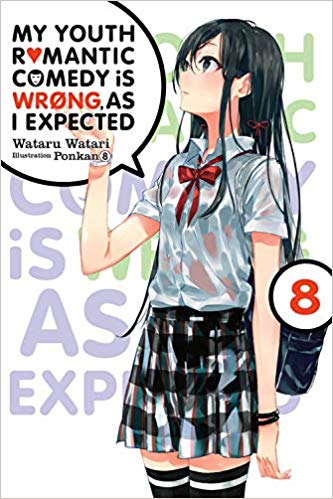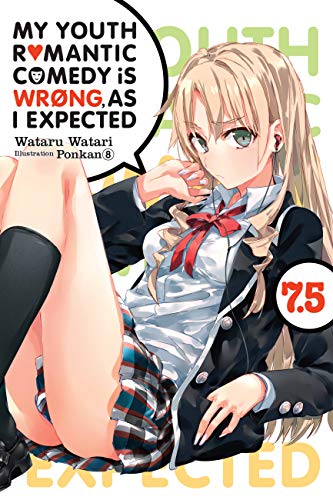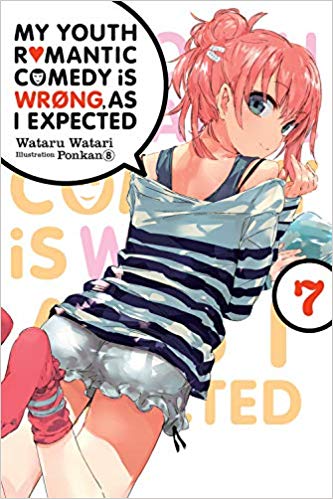By Wataru Watari and Ponkan 8. Released in Japan as “Yahari Ore no Seishun Rabukome wa Machigatte Iru” by Gagaga Bunko. Released in North America by Yen On. Translated by Jennifer Ward.
I have to hand it to the author, they are very very good at making me, as a reader, feel thrilling highs and desperate lows. Unfortunately, due to the nature of this series as a whole, each book always seems to end on a low, and so I often end up being depressed after a new volume of it. That said, I do still want to learn what happens next, even if I suspect it will once again be a journey where I grind my teeth and yell at everyone to actually have a decent talk with each other. But the nature of our three protagonists is such that that’s not going to happen – if they did, the series would have ended back at Vol. 3. Instead, buckle up for another adventure with Hachiman, whose cynical and roundabout narrative voice make me want him to meet Zaregoto’s Ii-chan someday. On the bright side, when he suggests his one solution to any problem, people are finally there to tell him to take his idea and shove it.
The soccer club manager we met in the short story volume has been nominated for Student Council President. She doesn’t want to do it, but also doesn’t want to deal with fallout of her dropping out or sabotaging herself. So she asks the club to help out. Hachiman suggests writing a bad speech so that everyone blames the speechwriter (him). This goes over like a lead balloon. Instead, first Yukino and then Yui decide to run against her, which will solve the problem, but also mean they likely would not be in the club any more. This also leaves Hachiman with nothing to do. After the middle of the book, which I will get to in a bit, he bands together with the rest of the main cast and comes up with a third option: convince Iroha that she really WOULD be a good Student Council President, thus removing the original request. Sadly, he does this without thinking of Yukino or Yui, particularly Yukino, and the result is the worst victory ever.
That said, the best reason to get the book are two scenes in the middle of it. The first has Hachiman and Hayama on the double date from hell, as his old classmate from middle school, Orimoto (the one he confessed to) and her friend want to get in with Hayama and he begs Hachiman to come along as he clearly doesn’t want to deal with this. After spending most of said date listening to Orimoto mocking and belittling Hachiman, Hayama snaps and tears them apart, pointing out the close relationships Hachiman has gained in high school. Tellingly, Hachiman is more upset by this than anything else. The second scene, my favorite, has Hachiman, at his lowest ebb, returning home and coming across Komachi, who he’d had a fight with at the start of the book. They make up quickly, and the ensuing conversation that follows is possibly the warmest, most heartwarming scene he’s had in the whole series to date, as he asks Komachi for her help and she talks about how worried she really is for him.
So the middle will make your heart grow three sizes, and the ending will make your face turn pale. But that’s typical of this series, which might better be called My Youth Romantic Soap Opera Is Wrong As I Expected. Like most soap operas, it makes you want to read the next book.





